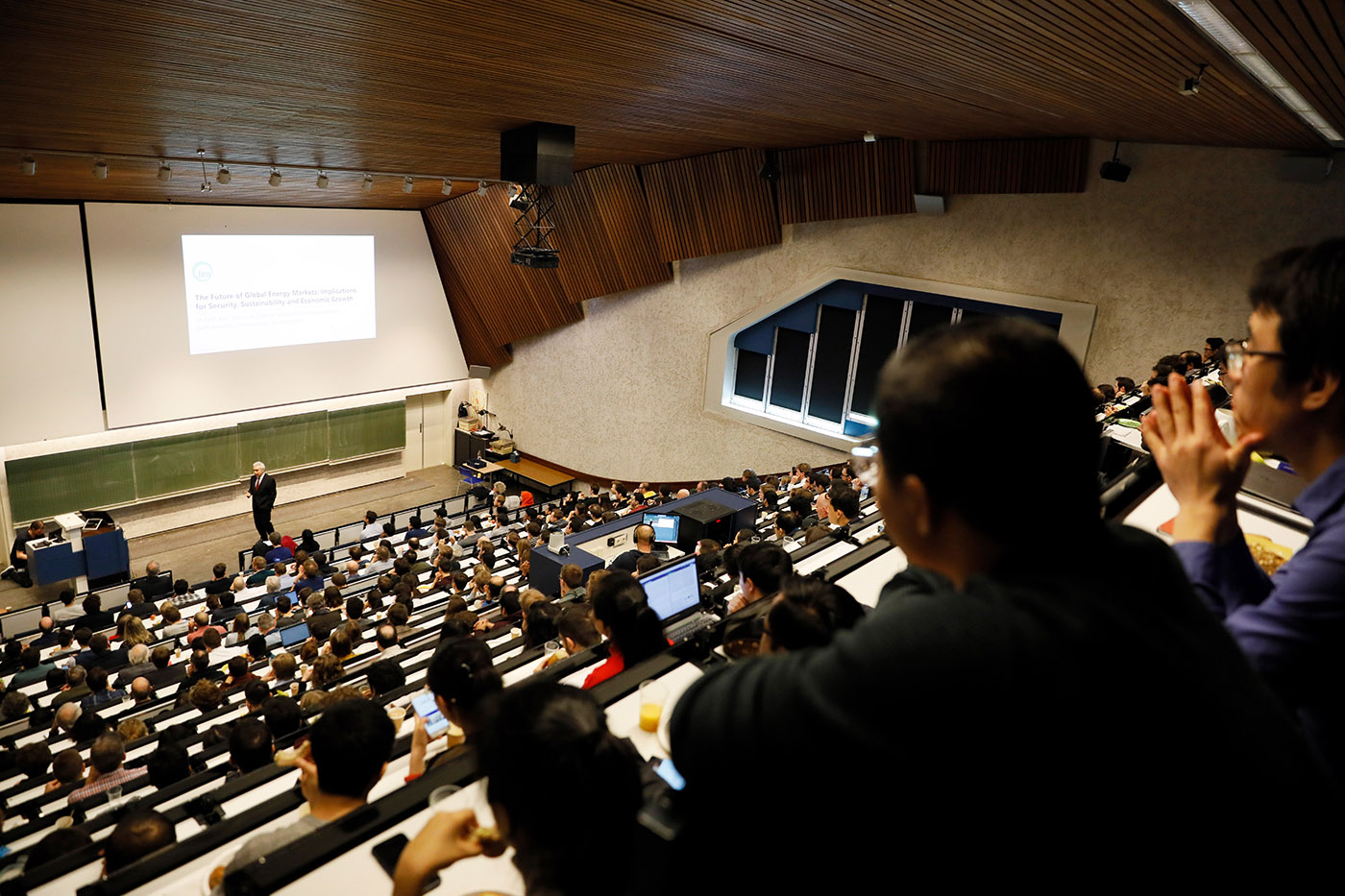The IEA’s Executive Director Dr Fatih Birol visited TU Delft. The IEA deals in facts, and the ones that Birol presented in his speech were sobering at best.
Dr. Birol drew a large audience. (Foto: Roy Borghouts)
As the Executive Director of the International Energy Agency (IEA), Dr Fatih Birol is primarily occupied with energy and energy markets. The yearly IEA publication World Energy Outlook was his initiative. But since climate change has its roots in the energy sector, greenhouse gas emissions are of major interest to the IEA, as is the campaign to provide more people access to electricity (a little under 1 billion people are still deprived of power).
Once Dr Birol was miked up, he started with the major global trends in energy.
- The US has entered a new oil and gas age, thanks to shale technology.
- There is a huge growth in the gas market, particularly due to China.
- Solar PV is the most successful form of renewable energy.
- Electricity is growing twice as fast as the total energy demand: more things are becoming electrical.
 Birol notices a growing disconnect between climate debate and reality. (Photo: Roy Borghouts)
Birol notices a growing disconnect between climate debate and reality. (Photo: Roy Borghouts)So, despite the current Dutch perspective, global energy developments are not focussed on green energy and CO2 reduction. In fact, Birol notices ‘a growing disconnect’ between the public debate (and the need to limit global temperature rise to 1.5 degrees) and what he called ‘real life’. According to IEA’s analysis of national policies, the world is heading towards a ‘catastrophic’ 3 degree temperature rise instead.
Focussing on Europe, Birol established that 95% of the carbon budget is already taken up by the existing infrastructure of buildings, transport and industry. “Starting tomorrow, everything you do has to be carbon-neutral,” Birol explained. “No airplanes, no traffic.” If that is too much to ask, then at least Europe should make new infrastructure as sustainable as possible. Existing infrastructure needs thorough interventions to reduce CO2 emissions. Coal plants, that Europe has invested in heavily, need to be retrofitted with carbon-capture technologies.
 Birol wants to electrify Africa. (Photo: Roy Borghouts)
Birol wants to electrify Africa. (Photo: Roy Borghouts)Birol’s personal mission is powering sub-Sahara Africa. “Electricity gives people the opportunity to study, it provides access to information, it enables people to develop themselves.” Thus, he motivated his drive. By chance, sub-Sahara Africa is rich in sun, wind and hydropower, and the price of solar and wind technologies has never been lower. So Birol’s effort is to mobilise investments into a green power revolution in Africa.
What can students do, someone from the audience asked. Birol looked around for people who, like himself, were around 50 years of age and had witnessed the flower power revolution. Birol is relieved to see a 60s revival in today’s youth taking to the street for the good of the climate. “Youth today is taking climate change seriously. Hold on to that. Push governments, push societies to limit carbon emissions,” Birol encouraged the students.
The only blip in Dr Birol’s lecture was a technical one. His lapel mike didn’t work, the hand microphone kept on ringing, and the headset was delivered late. “Can I start?”, the hyper polite, yet impatient Dr Birol requested, after several minutes on the stage.
- The lecture The Future of Global Energy Markets: Implications for Security, Sustainability and Economic Growth on 21 maart 2019 was part of the series Meet the Energy Leaders, organised by the TU Delft Energy Initiative.
Do you have a question or comment about this article?
j.w.wassink@tudelft.nl


Comments are closed.